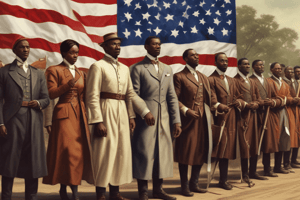Podcast
Questions and Answers
What year was the 15th Amendment, granting African Americans the right to vote, ratified?
What year was the 15th Amendment, granting African Americans the right to vote, ratified?
- 1873
- 1868
- 1870 (correct)
- 1866
The Civil Rights Act was passed without any opposition from President Johnson.
The Civil Rights Act was passed without any opposition from President Johnson.
False (B)
What were carpetbaggers?
What were carpetbaggers?
Northern Republicans who moved into the South
The _____ were a group that aimed to defend the social and political superiority of whites through violence and intimidation.
The _____ were a group that aimed to defend the social and political superiority of whites through violence and intimidation.
Match the following events with their significance:
Match the following events with their significance:
What was one of the major economic changes in the New South?
What was one of the major economic changes in the New South?
Atlanta, GA, became a major industrial city due to the expansion of railroad tracks.
Atlanta, GA, became a major industrial city due to the expansion of railroad tracks.
What were scalawags?
What were scalawags?
The congressional override of President Johnson's veto of the Civil Rights Act demonstrated the power of _____ in the legislative process.
The congressional override of President Johnson's veto of the Civil Rights Act demonstrated the power of _____ in the legislative process.
What was one common misconception about the corruption during Reconstruction?
What was one common misconception about the corruption during Reconstruction?
Flashcards are hidden until you start studying
Study Notes
Reconstruction Era
- Civil Rights Act of 1866
- Outlawed discriminatory Black Codes enacted by Southern states
- Passed by Congress, vetoed by President Johnson, but Congress overrode the veto
- 14th Amendment (1866)
- Granted citizenship to formerly enslaved people
- Intended to protect the civil rights of freedmen
- Impeachment of President Johnson (1868)
- President Johnson was impeached by the House of Representatives for violating the Tenure of Office Act
- The Senate trial resulted in his acquittal by a single vote
- Republican Ulysses S. Grant won the subsequent presidential election
- 15th Amendment (1870)
- Guaranteed the right to vote for all men, regardless of race
- Carpetbaggers
- Northerners who moved to the South during Reconstruction
- Included teachers, businessmen, political leaders, and some opportunistic individuals
- Scalawags
- White Southerners who supported Reconstruction
- Often opposed secession during the Civil War
- New South
- Post-Civil War South focused on economic development and industrialization
- Farming Changes:
- Sharecropping: System where a farmer worked a portion of a landowner's land in exchange for a share of the crops
- Often resulted in debt and limited economic mobility for sharecroppers
- Sharecropping: System where a farmer worked a portion of a landowner's land in exchange for a share of the crops
- Growth of Atlanta
- Atlanta emerged as a major industrial center
- Over 3,300 miles of new railroad track were built in the South, representing a 40% increase
- Cotton mills and textile factories thrived
- Funding Reconstruction
- Reconstruction efforts:
- Focused on rebuilding infrastructure: roads, bridges, canals, railroads, telegraphs, and public schools
- Added over $130 million to Southern debt
- Corruption:
- Widespread corruption plagued Reconstruction spending
- President Grant was aware of the corruption
- Southerners blamed African Americans and carpetbaggers for the corruption
- Reconstruction efforts:
- Spreading Terror: KKK
- The Ku Klux Klan (KKK) emerged to defend white supremacy and terrorize African Americans, carpetbaggers, and scalawags
- Employed violence, intimidation, and murder to achieve their goals
- Enforcement Act of 1870
- Federal response to KKK violence
- Banned the use of terror, force, or bribery to prevent voting
- Strengthened military presence in the South and outlawed the KKK
- Thousands of KKK members were prosecuted, leading to a decline in KKK activity within a few years
- End of Reconstruction
- Financial strain:
- Heavy spending on Reconstruction left Southern states with significant debt
- This debt contributed to the perception of corruption and fueled calls for an end to federal involvement
- White Southern Resistance:
- White Southerners formed groups to block African American voting and political participation
- Democrats in the South contributed to the growing resistance
- Economic downturn:
- The Southern economy faced challenges and a decline
- Compromise of 1877:
- Republican Rutherford B. Hayes was elected president through a controversial agreement
- Federal troops were withdrawn from the South, providing more autonomy to Southern states
- Democrats gained political power in the South and Reconstruction effectively ended
- The removal of federal troops allowed for the implementation of Jim Crow laws and the resurgence of white supremacy in the South
- Financial strain:
Studying That Suits You
Use AI to generate personalized quizzes and flashcards to suit your learning preferences.




